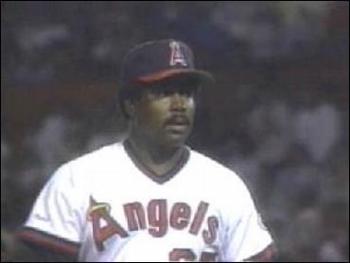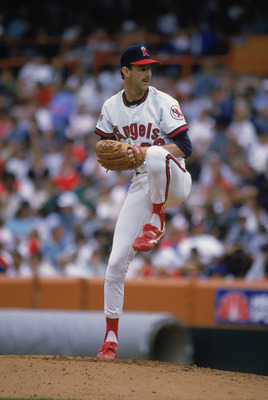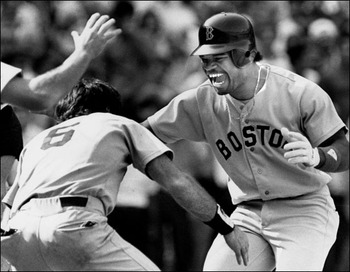Don't forget to check out the other articles in the "Forgiving Baseball's Scapegoats" Series: Fred Merkle, Hack Wilson, Johnny Pesky, Ralph Branca and Leon Durham.
The term closer didn't really become a regular term until a few years later when Dennis Eckersley started his nightly appearances and Bobby Thigpen saved 57 games in 1989. From the 1990's on every team had to have a closer but before that you just called it a reliable relief pitcher. Donnie Moore was more than just a reliable relief pitcher for the California Angels, he was dominant.
Moore's career had started in 1975 with sporadic appearances for the Cubs. He was traded to the Cardinals in 1981 for Mike Tyson (not that Mike Tyson). His contract was then sold to the Milwaukee Brewers,who returned the contract back to the Cardinals a short while later and was then traded to Atlanta. He played a few years in Atlanta and had slight success. In 1985 Moore was signed by the Angels and it was a tremendous move for the Angels and Moore.
He finally put everything together as the Angels challenged the eventual World Champion Kansas City Royals down to the last few days of the season finishing just one game behind the Royals. Moore was spectacular that season saving 31 with only 8 blown saves. He also won 8, lost 8, made the All Star team, finished 7th in the Cy Young and 6th in the MVP voting. Not bad for a relief pitcher.
The 1986 season was not as strong but the Angels didn't need him to be that year as they won the American League West and moved on to the ALCS for the first time since 1982 and only the third time in their history. The series started well for them as they got out to a quick 3 games to 1 lead and it looked like this may actually be the year for the "singing cowboy" to get his title.
Game 5 looked like the moment of ascension for the halos. Boston jumped out to a quick 2-0 lead in the second but the Angels fought back and when Bobby Grich hit a two run Home Run in the 6th to give California the lead, Angels Stadium sang a halo chorus. It got louder an inning later when the Angels scored two more to go ahead 5-2 and there was no way this team could lose with Mike Witt on the mound.
The 9th inning was nothing but tension. It was dueling curses. The Red Sox curse of the Bambino vs the Angels curse of unknown origins that had plagued them through the decades. Now they just needed 3 outs without allowing 3 runs and they would be in the World Series. Their young ace Mike Witt was tired but he came out for the 9th inning. It started badly with a single by Bill Buckner but when Jim Rice struck out looking the Angels fans gave a sigh of relief. Rice was the bat that scared everyone. They should be fine now. Just 2 outs left. Don Baylor, the former Angel MVP and fan favorite, stepped in for the Red Sox and did what he had done for years in this stadium, what the fans had always loved to see. He drove a pitch into the left field stands for a two run Home Run. The fans didn't like it so much when he was wearing another uniform.
Still holding a one run lead and one out the Angels allowed Mike Witt to face Dwight Evans and Dewey popped out to third base. Two out and the bases were empty. Witt needed just one more out with the bases empty and he was on his way to Angels immortality. Standing in his way was Rich Gedman who was 4-4 on the day with a Home Run, a double, two singles, two runs and two RBI but with the bases empty and an 0 for 1 Dave Henderson following Gedman to the plate, Witt felt he would get the chance to finish this thing off. He felt he had earned at least that. So when he turned around and saw Bob Boone pop up and head towards the mound he was a bit surprised.
"I thought I had a pretty good game plan going in for Gedman, but it wasn't working too successfully." Witt said after the game. Manager Gene Mauch was much more direct: "The bottom line is that Rich Gedman could hit Mike Witt at midnight with the lights out." So Mauch made the decision to go to the pen. He brought in Gary Lucas who had great success against Gedman and despite the extra tension, the Red Sox figured this was it. Game over. Then Gary Lucas did what he had not done in the last 400 innings he had pitched. He hit Rich Gedman. On the very first and last pitch he threw that day Gary Lucas hit Rich Gedman with the pitch.
So the drama continued and Mauch trudged his way back out to the mound to call on another pitcher. And here is where Donnie Moore enters the picture. Bottom of the 9th. Two outs. One run lead. Runner on first and stepping to the plate is Dave Henderson. A player with power and on the rise but not yet at the peak of his career. Give it a few pitches and the peak of his career will begin (and won't end for another seven years).
The drama started with ball one, followed by a called strike one. Henderson swung through the third pitch and now Moore had the advantage. One more strike and it was all over. Ball two evened the count. Henderson couldn't afford to be picky now. Anything close he had to get the bat on the ball to stay alive at the plate and in the season. That is not the way a batter likes to approach an at bat. Moore came back with a breaking ball and Henderson fouled it off. Then another breaking ball and another foul ball. It was a long at bat for a situation this tense. Now it was time for Moore to decide. He'd thrown two straight breaking balls and Henderson fouled off both of them. Should they give him one more breaking ball and hope he hasn't got the timing or should they throw the split finger fastball and hope he swings through it?
The problem was that Moore's arm was hurting and the pressure the split finger put on the arm made the pain multiply. Moore looked in at Boone who signaled for a forkball but Moore shook him off. He thought Henderson has just missed the last two curves. They needed an out not another foul ball. Boone dropped a single digit, indicating the fastball and Moore nodded in agreement. Moore lifted his leg to start the pitching motion and put everything he had on the pitch.
The pitch was where he wanted it, on the outside part of the plate. Watching the video Henderson looks like he starts his swing with a little question of what he's seeing. His first shift in weight is the movement you normally see on an awkward swing. The scouts call it hitting with your ass leaning towards the dugout. The ball headed down, again, right where Moore wanted it. Down and away with Henderson leaning back should be a strikeout and the Angels should be in the World Series.
Except that Henderson adjusted quickly and recovered. He shifted his weight, dove into the swing and caught hold of it. You could search for years and not find a more opposite emotional reaction to one single swing. Moore immediately swings around to see where the ball goes while Henderson takes 3 steps down the line and leaps with a giant grin on his face. The ball is still in the air and it could still be caught. This was not one of those upper deck, no doubt Home Runs. Moore stands, motionless on the mound and watches. Hoping, praying silently that Henderson had just missed it. Henderson lands after his first leap and takes 5 more steps toward first. He doesn't sprint to first. It doesn't matter. This is either going to be a Home Run or an out. There are few other options. Then it landed. Three rows into the stands and Henderson literally jumps for joy then trots around the bases, smiling the whole time. It would be his only hit of the Series. It takes a minute, literally, for the Red Sox celebration and greeting committee to escort Henderson back to the dugout. Meanwhile, Moore stands there and watches. Waiting for the game to resume.
Moore got the last batter, Ed Romero, on a five pitch at bat. Growing up my understanding was that this was it and from there the Red Sox went onto the World Series but as I get older and research the game more the importance of the Henderson home run becomes minimal (not in the sense of impact on the series because clearly it changed the series but in the sense of pinning the blame for the loss on Moore). Sadly, unlike many of our previous forgiven scapegoats this does not end with a long successful career and happy life despite the lasting memory. Moore struggled with injuries in 1987 and the Angels fans booed him relentlessly while the front office questioned his toughness. He demanded a trade but no teams were in the market for a pitcher with an injured arm so he faded out of baseball, last pitching for the Angels on August 8, 1988. The pain of being Donnie Moore finally became too much and on July 18, 1989 Donnie Moore shot his wife and himself in front of their children. Thankfully his wife survived, however, it is truly a tragic ending for someone who just a few years before had been considered a fun loving, likable guy.
There are probably a million reasons you cannot blame Donnie Moore for losing this Series but here are just a few:
1. Instead of blaming Donnie Moore we should be praising Dave Henderson for a hell of an at bat. With the season on the line the Red Sox allowed a batter, who was hitless in the series to that point, face a pitcher at the top of his game. Down to their last strike Henderson fought off two very good pitches and made a great adjustment on a good pitch by Moore. Instead of looking at this as a bad pitch we should look at this as a great piece of hitting.
2. This wasn't the end of the series, or even the game. Historically we have seen the Angels as walking away and folding once Henderson hit the Home Run but that is certainly not the case. Henderson hit the Home Run in the top of the 9th. In the bottom of the 9th the Angels tied the game up. With just one out and the bases loaded the Angels had Doug DeCinces and Bobby Grich (their 5th and 6th place hitter) at the plate and needed only one run to win it and end the Series. DeCinces was 2-4 with two doubles on the day. DeCinces flew out to Right field, not deep enough to score the run. Grich followed. He was 1-5 on the day with a two run Home Run. He lined back to the pitcher and the Angels left the bases loaded.
3. Moore pitched a scoreless 10th inning against the heart of the Red Sox order. He also pitched in the 11th and after loading the bases with nobody out gave up a run when Dave Henderson (again) hit a sacrifice fly to right field to score the winning run. Moore then got the second out of the inning before being relieved and the Red Sox won by one run.
4. This was only Game 5 of the Series and the Angels had two more chances to win one game. Their Game 6 starter, Kirk McCaskill lasted only 2 1/3 innings before finally being removed. John Candaleria, their Game 7 starter lasted only 3 2/3. With starting pitching like that it seems odd to pin the loss of a series on a tired relief pitcher.
5. The Angels (not Moore) blew another lead in Game 6. If the momentum had shifted as dramatically as we have been led to believe after Henderson's Home Run, the Angels don't seem to have noticed. Not only did they fight back to tie Game 5 immediately after Henderson gave Boston the lead, they left the bases loaded and started off Game 6 in convincing fashion. In the top of the first in Game 6 the Angels sent eight men to the plate and with a walk and back to back doubles by Reggie Jackson and Doug DeCinces, the Angels were out to a 2-0 lead. The Angels gave the lead right back to Boston in the bottom of the first. The Red Sox scored two runs on 0 hits in the inning with two walks, a passed ball, and two well placed ground balls to advance the runners. Had the Angels avoided the wildness of that first inning the momentum could have swung right back to them. While Oil Can Boyd would settle down and pitch six more strong innings for Boston, McCaskill would give up a total of 7 runs in less than three innings.
6. The Mauch/Witt/Lucas trio have avoided blame almost entirely. I am certainly not suggesting that we should start a campaign to turn these three (or anyone ever) into scapegoats but realistically these three led to the situation that Moore faced. With a 5-2 lead going into the bottom of the 9th the Angels needed only three outs before giving up three runs. Of the four runs scored in the inning, 2 belonged to Witt and one belonged to Lucas. Only one belonged to Moore. With Witt pitching well and a one run lead everyone believed Witt would get a chance to finish what he started. Moore himself said "I thought it was Mike's game to win or lose. I thought I wasn't going to pitch again until the World Series."
7. The Angels were missing a major part of their offense after Game 3. Southern California hadn't gone this crazy over a rookie since Fernandomania. With Disneyland just blocks away, Wally World was open for business at Angels Stadium. Wally Joyner finished just 4 first place votes behind Jose Canseco in the Rookie of the Year voting and was hitting .455 in the first three games of the series. He had 5 hits, 3 runs, 2 RBI, 2 doubles and a Home Run in games 1-3. The Angels won 2 of those games. Something happened, no one quite knows what, that caused Joyner to develop an infection. He was in the hospital fighting off a fever when Donnie Moore faced off against Dave Henderson. Although Gene and Jackie Autry told the press Joyner would be back for the final two games, the doctors had other ideas and Joyner listened to the doctors. I am not questioning Joyner's decision not to play because he was very very seriously ill, but with the groove that Joyner was in through the first three games, Mike Witt may have had a lot more run support during Game 5 or McCaskill may have had a bigger lead in the first inning of Game 6.





That's really a bad break for Donnie Moore. If you ever do a list of "Tragic Endings", he should probably be on that list too.
ReplyDeleteThanks for the detail in this tragic story. I always thought it was such a sad story. As in your other great articles with this theme,there are really many other circumstances that effect the outcome of the game.
ReplyDeleteGene Mauch was one of the reasons for the collapse of the 1964 Phillies.
I am sure Donnie Moore felt the guilt of the loss but maybe in addition he had family, money problems which led to his suicide.
TJD
You are absolutely right. Mauch's mismanagement of the pitching staff in 1964 was a major factor in their collapse. He usedonly two pitchers in the last two weeks while the Phillies continued to lose and the Reds and Cardinals continued to win.
DeleteYou are also correct that there are probably many other factors leading to the tragedy of Donnie Moore. There is no way for us to know exactly what goes on in a players personal life.
I had never read about Donnie Moore before. Definitely a tragic ending. I will have to ask Jared if he knows about him. It's interesting to read this and think about the perspective of the relief pitcher/closer. They must be under so much pressure and they are probably a very common scapegoat! I know I've placed the blame on the closer while watching games before but probably should have thought about all the factors! Very interesting post!
ReplyDeleteI'm glad you enjoyed the post Neri. I have often blamed the relief pitcher as well but they are given such a small margin of error and such high expectations that it is hard for them to succeed. A starting pitcher normally is given about 5-6 innings to work out of trouble or to allow his team to come back. A relief pitcher is usually given an inning or less and often comes in when the starter has gotten past the point of being able to save himself. If the closer is not perfect he is the one who gets blamed. I'd love to hear Jared's take on the article too.
ReplyDelete